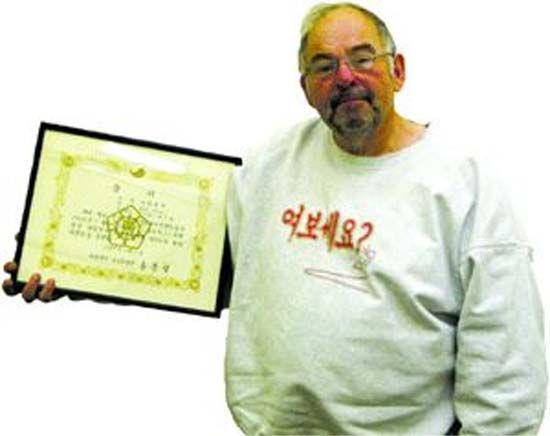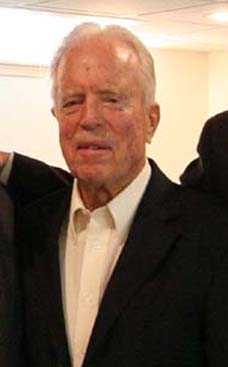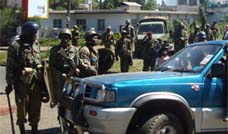
‘‘I joined the Peace Corps because in the 1960s, when we (the United States) were involved in the Vietnam crisis — although I wasn’t anti-government I decided if I was going to do something, I would do something more worthwhile,’’ said Lyle Jensen, a retired education professor who prior to his career teaching at Baldwin-Wallace, joined one of America’s most prestigious diplomatic programs. While he is not sure he gave a lot to the United States, Jensen feels he gained a lot personally from the experience. An only child, Jensen joined in Corps in its earliest days, the only one of his friends and family to do so. The organization had been in existence for just three years before he enrolled. ‘‘It was a very intense training program, and we trained in Bisbee, Arizona,’’ Jensen said. ‘‘Our host teachers came to teach us the language, culture — all those things.’’ During the four months of training, recruits would sometimes spend 12 hours each day studying the language in preparation. Of the 67 members that started the program, only 21 made it through. As a teacher in an all-boys school, he taught nine classes of 75 boys a day, and school lasted for five and a half days a week. At the time, Korea was still considered a third-world country, and there was no heat in the classrooms with limited electricity. ‘‘I developed wonderful relationships with my teacher colleagues, who are life-long friends,’’ Jensen said. ‘‘My Korean language teachers are my very best friends. When I first arrived in January 1968, 10 days after we arrived the USS Pueblo was seized by North Korea. All of a sudden, there was an intense military presence because the South Koreans were reacting. They kept the ship and American crew prisoners for over a year, and all of a sudden there were tanks on the street and soldiers on the streets with guns, and it was unnerving at first, but that was an interesting experience.’’ His first trip sparked what Jensen referred to as his ‘‘41-year love affair’’ with Korea, the ‘‘land of the morning calm.’’ Since then, he has gone back to live in multiple different countries; six months in Thailand, six months in China and four months in Japan.
Lyle Jensen shares tales of Peace Corps experience in Korea in 1960's
Ashville man shares tales of Peace Corps experience
By Jessica Wasmund jwasmund@post-journal.com
A Soldier Of Peace
Caption: Lyle Jensen holds a Chung-sa, which is a certificate or diploma, Korea issued in recognition of his services.
1/19/2008 - John F. Kennedy touched millions of Americans in his inaugural speech, and his instructions to ‘‘Ask not what your country can do for you — ask what you can do for your country’’ have gone down in history.
His moving words left a lasting impression on many, including one Ashville native who took the president’s address to heart and decided to dedicate his time to improving America’s foreign relations.
‘‘I joined the Peace Corps because in the 1960s, when we (the United States) were involved in the Vietnam crisis — although I wasn’t anti-government I decided if I was going to do something, I would do something more worthwhile,’’ said Lyle Jensen, a retired education professor who prior to his career teaching at Baldwin-Wallace, joined one of America’s most prestigious diplomatic programs.
While he is not sure he gave a lot to the United States, Jensen feels he gained a lot personally from the experience.
An only child, Jensen joined in Corps in its earliest days, the only one of his friends and family to do so. The organization had been in existence for just three years before he enrolled.
‘‘It was a very intense training program, and we trained in Bisbee, Arizona,’’ Jensen said. ‘‘Our host teachers came to teach us the language, culture — all those things.’’ During the four months of training, recruits would sometimes spend 12 hours each day studying the language in preparation. Of the 67 members that started the program, only 21 made it through.
After graduating with a master’s degree in English literature, Jensen was searching for a way to explore the world outside the sheltered home environment he had grown up in. At age 24, he completed his training and left for Korea.
‘‘I was originally assigned to go to a country in Africa, but there was a political up-rest and the program was canceled,’’ Jensen said. ‘‘So I was given two options, a chance to go to Korea or Turkey. I actually selected Korea because I found out I would have the opportunity to live with a Korean family and that was very important to me. That option wasn’t available in Turkey — you basically lived in an apartment with other volunteers.’’
Once arriving and meeting his host family, Jensen felt he found another home.
‘‘Being an only child I never had any siblings, but when I was there I suddenly had four sisters and a brother,’’ he said. ‘‘They were absolutely wonderful. There were a set a twins — boy and a girl — who were 18. What was wonderful about that was English wasn’t their language so I learned Korean from them and I of course taught the kids English. I learned the wonderful customs of Korea that I still practice today.’’
He called himself ‘‘the mutated sibling,’’ because with his large stature he towered over the tiny Korean people.
‘‘Whenever I went somewhere, kids would come from every direction and point at me and say ‘megook,’ which means ‘American,’’’ Jensen said. ‘‘The saddest thing about this is, is when the military went to Korea kids would chase the soldiers yelling megook. Well, it sounds like ‘me, gook,’ so the Americans in turn started referring to the Koreans as ‘gooks,’ which is such an insult. Because the Americans did not school in the language, it was just an ugly thing — still is. That issue has always troubled me because it was an innocent thing and Americans turned it into something they shouldn’t have done.’’
However, Jensen had many positive experiences as well. One of the most interesting things he learned about the culture was its tremendous respect for older people. Even the twins, who were born minutes apart, had to address each other in a different way. The boy, who was the older of the pair, was always addressed in a very formal tone by his sister, yet he in turn spoke to her in a completely different manner.
‘‘You constantly switch your speech forms, and if you speak to someone older than you, you would use an honor form,’’ Jensen said. ‘‘You would never mix the languages, and it’s kind of an interesting concept.’’
He lived in Korea with the Peace Corps for two years, but chose to extend his stay an additional year. In the three years, he remained living with his hosts the entire time. Since his initial trip, he has been back a dozen times.
‘‘When you stop to think of it, that was a big step for them — to take in somebody from another country and culture who couldn’t speak their language,’’ Jensen said. ‘‘It was just a remarkable experience. To this day, they’re my sisters and my brothers — we’ve very, very close. Whenever I go back we have a great celebration.’’
Another important lesson he took from the experience is learning what it means to be a minority. Jensen said sometimes it was difficult to fit in, and it gave him a sense of what it is like to be different. He has since learned to sympathize with issues concerning racism.
‘‘While there, I traveled throughout the country,’’ Jensen said. ‘‘As a Peace Corps volunteer, we lived off the economy. I taught English as a second language, so I earned as much as a Korean teacher. We didn’t receive a salary, we received a living allowance which meant we had to be very frugal — I wore the same pair of shoes for three years.’’
As a teacher in an all-boys school, he taught nine classes of 75 boys a day, and school lasted for five and a half days a week. At the time, Korea was still considered a third-world country, and there was no heat in the classrooms with limited electricity.
‘‘I developed wonderful relationships with my teacher colleagues, who are life-long friends,’’ Jensen said. ‘‘My Korean language teachers are my very best friends. When I first arrived in January 1968, 10 days after we arrived the USS Pueblo was seized by North Korea. All of a sudden, there was an intense military presence because the South Koreans were reacting. They kept the ship and American crew prisoners for over a year, and all of a sudden there were tanks on the street and soldiers on the streets with guns, and it was unnerving at first, but that was an interesting experience.’’
///
Passing On The Peace Corps Legacy
As a teacher back in the United States, Jensen advocated the Peace Corps to many of his students, urging them to join and share in the tremendous experiences he had.
‘‘I’ve had probably 15 former students who have joined, and many of them attribute their experience to me because I’d share with them my memories of a different culture, and all of them took advantage of the opportunity,’’ Jensen said. ‘‘They’d come to see me when they came home, and it amazed me how they had matured. When you’re in this situation your viewpoint of the world changes — you’re looking at things in a different perspective. You’re no longer looking at things as a typical American.’’
Jensen kept in touch over the years with those students, and made new friends with fellow Peace Corps members.
‘‘There’s an unspoken bond between those of us who have been in the Peace Corps, regardless of our different ages,’’ Jensen said. ‘‘There’s a fellow who teaches at BOCES — Adam Padd — who is 30 years younger than me. We became acquainted this last fall and I found out he had been a Peace Corps volunteer in Nicaragua, and there’s just a wonderful bond that exists between us. Here we are, different generations, but we’re on the same page — nobody knows unless you were there.’’
One of his fondest memories is meeting Pearl Buck, the Nobel Prize-winning author of ‘‘The Good Earth.’’ Ms. Buck started an orphanage for Euro-Asian children, an outstanding act considering the negative connotations associated with children of mixed descent. According to Jensen, people of mixed race were not accepted by the culture, to the point of being considered non-persons.
However, while Jensen’s experience was a very positive one, he admits that there are many dangers in such situations. The recent death of John Granville, the Buffalo-born diplomat who was slain in the Sudan, was especially heart-wrenching for Jensen, as Granville himself had been a one-time Peace Corps member.
‘‘I broke out in goosebumps (when I heard of his killing),’’ Jensen said. ‘‘That was extremely unfortunate. Obviously, his commitment was to make a difference, and I think that’s why he was in the foreign service. It was just tragic, and I’m sure the people who knew him and worked with him as a volunteer — I imagine he was a very sensitive, caring person.’’
Overall, Jensen took with him some important life lessons, including how lucky Americans are.
‘‘America is the land of plenty — we have everything that we want,’’ Jensen said. ‘‘We have all kinds of choices, even food choices. I’ve learned when you experience life on the other side of the world, it may not be as comfortable. We learn there are different priorities, such as not owning so many material possessions, you start seeing things a little different.’’
He feels that by being immersed in another culture, individuals become more aware that there are many different ways of doing, experiencing and feeling things. It is important to be receptive of new ideas. Jensen also believes he developed a new sensitivity after going.
‘‘America’s viewpoint is not the only viewpoint — we tend to be very vocal about things,’’ Jensen said. ‘‘From my perspective when I visit now, because Korea has become so international, their culture has been diluted. Some of the wonderful traditions and institutions have become impacted by other countries. But there was a tradeoff — they gained tremendous ground in industry and they are no longer a third-world country.’’
His first trip sparked what Jensen referred to as his ‘‘41-year love affair’’ with Korea, the ‘‘land of the morning calm.’’ Since then, he has gone back to live in multiple different countries; six months in Thailand, six months in China and four months in Japan.
Jensen said not a day goes by he does not reflect upon his experiences. He said his experiences have made him more sensitive, more tolerant and established a life-long interest in learning about other cultures and languages.
‘‘These days we’re very sensitive to immigrants coming in, but we have to also remind ourselves lots of these people are leaving nothing,’’ Jensen said. ‘‘Being in the Peace Corps has also made me a little bit of a risk-taker. When I travel I try to take the road not taken — I’m more interested in getting to know people and connecting with them. I like to find my own path. I’ve been to Europe to a few times, but Asia is where my heart is.’’
Jensen urges anyone interested in joining the Peace Corps to contact lylejensen474@yahoo.com to learn more about his experience.










